 |  |
By David Kier

Baja California is so rich in historical treasure and stories that one can have a fulfilling vacation just exploring these artifacts from the past. One little-known artifact is the massive stone dike constructed by the Cochimí Indians to protect the mission fields at San Ignacio, named La Muralla.
Flash floods are perhaps the most destructive force in the deserts of Baja California. They build up energy quickly from the sudden summer rains where the water pours down so fast that the soil cannot absorb it. The result is an immediate run off, downhill, and anything it the way stands little chance of escape. Sadly, for the people of the mission, these flash floods could erase years of work and take away crops, soil, and livestock.
San Ignacio, one of the most ideal locations for a mission colony, was maybe the hardest hit by the torrential floods. Padre José Mariano Rotea was in charge of San Ignacio following the death of Fernando Consag in 1759. Rotea was a builder and it was he who began the construction of the giant stone church of San Ignacio (completed by the Dominican Padre Juan Gómez in 1786, following delays due to the expulsion of the Jesuits, in 1768).
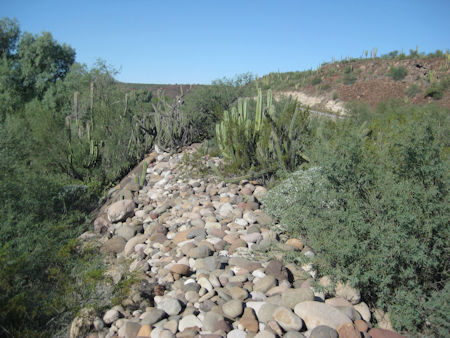
The Muralla was not the first attempt to tame the floods, but the third. Detailed in the excellent 1952 Jesuit history book, Black Robes in Lower California; the first wall took ten years to build but in just moments, a single flood had torn it apart. A second wall, again built by the native Indians, took three years to construct of stone and mortar. A flood in 1761 broke through it and destroyed the wheat and corn fields. Late in 1761, Padre Rotea organized a labor force from the six pueblos (visitas) of San Ignacio to begin work on a third wall. In just seven months, the wall was finished. It measured over 1,400 feet long, 20 feet wide, and 16 feet tall. Additions made later, doubled the width and the overall length reached up to three miles.
Padre Rotea detailed the project in his 1762 report submitted to the Visitor General of the missions, Ignacio Lizazoáin:
The agricultural works are the ones that suffer from storms which cause us furious torrents in the arroyos of these missions. This one at San Ignacio has suffered greatly; because, having been one of the best missions in its abundance of land and water, the floods have been able to leave it very different from what it is said to have been. And so that what remains of it won’t be lost, it has been necessary to construct an enclosure or wall of rock and earth for the protection of the farm land. This was tried but didn’t work in the year of 1761, because a furious storm in September swept away what had taken seven months to build. But because such protection is so essential for the well-being of the mission, I proposed to the people of the six rancherias that it would be advisable to build another one, stronger and of greater height, which they agreed to do, offering to stand themselves, without shifts, until its completion. This they did for some months, until taking pity on them, I told them to continue by shifts, as before. Another similar and much greater one was built over a period of nine to eleven years and was destroyed in an instant by another flood. A rock and mortar dam which they later built over a period of three years, in a short time was destroyed by yet another flood. The work which is now in progress has been done with such relish it seems, that without the assistance of the soldiers (as is the custom so they don’t slacken) they have done 513 varas of said enclosure in seven months. It is seven varas wide and six high, all of rock, which they have offered to come and secure next week with a land fill embankment as judged necessary.1 vara = 2.76 feet
To see a surviving section of La Muralla in the 21st Century, drive past Km. 73, the San Ignacio entrance on Hwy. 1, to a large dirt lot on the right (south) located before reaching the Baja Oasis Motel. Park and walk to the large dike, covered with brush, to examine this wonder of over 250 years ago.
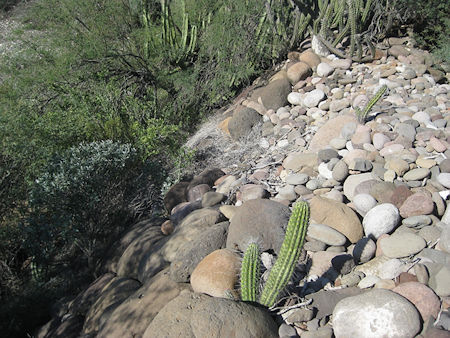
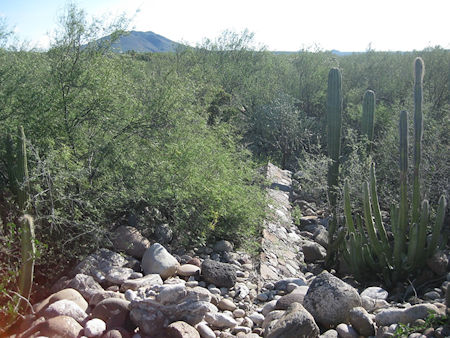
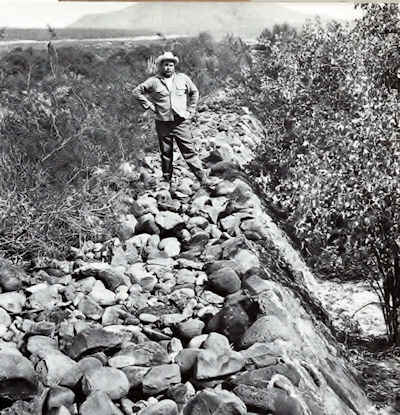
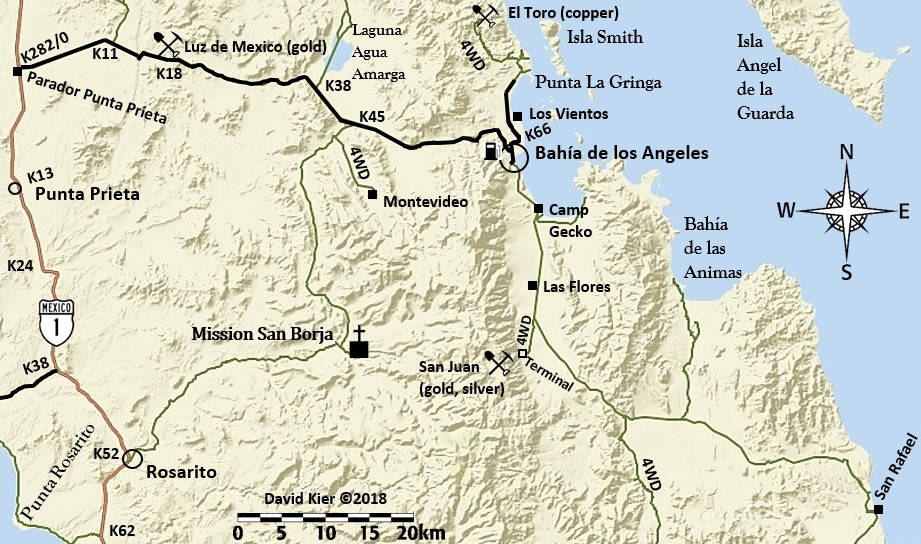
About David
David Kier is a veteran Baja traveler, author of 'Baja California - Land Of Missions' and co-author of 'The Old Missions of Baja and Alta California 1697-1834'. Visit the Old Missions website.

I recently purchased insurance for my trip with Baja Bound because of their reputation and reviews....

Excelente servicio on there part every time

Super easy to purchase just the coverage you need when crossing the border in your own car. I...